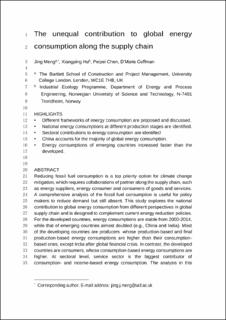The unequal contribution to global energy consumption along the supply chain
Peer reviewed, Journal article
Accepted version

Åpne
Permanent lenke
https://hdl.handle.net/11250/2727481Utgivelsesdato
2020Metadata
Vis full innførselSamlinger
Sammendrag
Reducing fossil fuel consumption is a top priority option for climate change mitigation, which requires collaborations of partners along the supply chain, such as energy suppliers, energy consumers and final consumers of goods and services. A comprehensive analysis of fossil fuel consumption is useful for policymakers to reduce demand but still absent. This study explores the national contribution to global energy consumption from different perspectives in the global supply chain and is designed to complement current energy reduction policies. For the developed countries, energy consumptions are stable from 2000 to 2014, while that of emerging countries almost doubled (e.g., China and India). Most of the developing countries are producers whose production-based and final production-based energy consumptions are higher than their consumption-based ones, except India after the global financial crisis. In contrast, the developed countries are consumers, whose consumption-based energy consumptions are higher. At the sectoral level, the service sector is the largest contributor to consumption- and income-based energy consumption. The analysis in this study can create opportunities for all the parties alongside the supply chain in reducing fossil fuel consumption.
